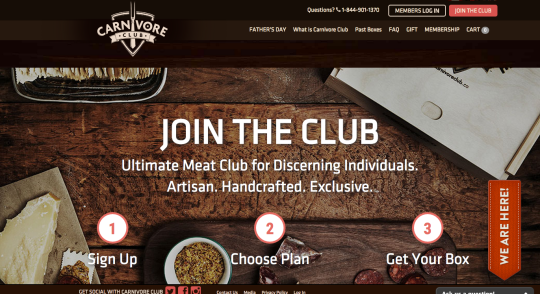
Toronto-based online entrepreneur and angel
investor Tim Ray says that his
business decisions—all of them with good pay-offs so far—are very much like his
approach to playing Monopoly. “Own the board,” advises the fun-loving,
hard-driving 34-year-old. “Purchase everything, mortgage what you have to.”
Tim used the proceeds of the sale of his
first e-commerce venture, FoodScrooge.com,
to fund Carnivore Club, a
subscription service that curates a monthly box of gourmet cured meats
(packaged in a faux wood box that looks like a cutting-board) for customers in
Canada, the U.S. and, most recently, the U.K.
The idea of a monthly mail-order box of
goodies—whether fruit or chocolate or leather-bound books—has been around for
generations. But the Internet, with its unlimited, multi-dimensional
possibilities for outreach and marketing, has conferred super powers on this
business model, transforming it into a different creature altogether from your
Aunt Sally’s fruit-of-the-month club.
Yahoo asked the founder and CEO of
Carnivore Club, which launched in 2013, to outline the top five advantages of
the subscription commerce model for aspiring entrepreneurs hoping to enter the
fray. Here’s what he told us!
1) This is the easiest online
business model to operate: a one-size-fits-all box, sent out once a month.
Easy was what Tim Ray was looking for.
Artisinal producers provide their meats for the box at cost in exchange for the
free publicity and potential new buyers. (To avoid international regulatory
complexities, Carnivore Club only works with distributors who are already
importing whatever product they want to feature in the box.) The company has
built both its identity and cachet on a video marketing campaign,
initially designed to appeal to the same demographic of unapologetically
bromantic consumers who love Judd
Apatow films nearly as much as they love roasting meat on a stick. The
evolving suite of videos promote a corporate image that’s goofy, at times
sexist and always outrageous.
2) There’s limited margin
erosion from price competition.
“It’s very tough to commoditize a curated
subscription,” says the top Carnivore, “even when boxes in the same category
offer different monthly offerings.” In other words, through careful choice of
what goes in the box, subscription commerce entrepreneurs are able to protect
themselves from copycats who might try to offer similar products at a cut-rate
price. “Entrepreneurs are able to add value in their ability to curate amazing
goods and build trust.” The Internet adds value by providing a free marketing
platform with unlimited outreach for the brand.
3) The subscription box model
caters to fans of the four-hour work week.
“This business model makes it very possible
to outsource core functions—tech, marketing and logistics—to various
subscription vendors. It also provides a great work/life balance, once scaled
to the desired level.” The happily married father of a two-year-old girl, Tim
seems to have achieved that balance (although we somehow doubt that he works
only four hours a week!). He does, however, ride his bicycle 11 miles each way
to work, supplemented by a 40- to 50-mile ride every weekend. (“I have to work
off all the meat!” he told us.)
4) Cashflow problems are
minimized.
The pre-purchase of monthly subscription
boxes allows entepreneurs to forecast accrued revenue, explains Tim, enabling
prudent investment in marketing activities—and avoiding the need for a huge
amount of start-up funding. He advises devoting 100 percent of your
proceeds—“and then some!”—to marketing in the first 24 months after launch.
That’s the approach that’s worked for so far for this two-time winner. “Once
the infrastructure and scale are in place, adjust expenditures and realize cash
returns. Of course, you have to be prudent: Avoid self ruin and always have
rainy-day cash or credit in reserve.”
5) The subscription commerce
model is, according to Tim Ray, lots of fun.
“In contrast to an e-commerce platform that
merely sells goods, your company is the brand and the product. Such a
company is in a better position to create a passionate customer base who will
act as advocates for your brand.” The relationship is more than merely
transactional, explains the MBA graduate of Queens
University. “This is essentially different from an e-commerce company that
resells wares and competes on price and service—where loyalty is, at best,
marginal.”
Why Salumi?
We asked Tim what made him decide on cured
meats, rather than something else—for instance, something he might be able to
procure for free rather than simply at cost—for his product line.
It turns out that he wasn’t a particularly
savvy consumer of salumi before he
started Carnivore Club, beyond a fondness for trendy
Toronto hot spots where he enjoyed ordering a charcuterie board with a pint of
beer or a glass of wine. “I approached the business as a fan rather than a
critic,” he told Yahoo.
That approach, however, was informed by all
the solid business knowledge this up-and-coming entrepreneur had already
acquired. “As far as e-commerce goes, cured meats is the unicorn of
categories,” he told us with more than a little glee.
A valuable, scalable e-commerce business,
according to Tim, must satisfy three criteria:
1) A high profit margin
2) Durability/shelf stability
3) Light weight and/or high cost
per ounce
It’s a no-brainer when laid out so clearly:
These requirements ensure that the ecommerce business owner will offset the
costs of shipping, maximize profits and be able to compete successfully with
any version of the product that might be available locally.
“Wine clubs, for example,” notes Tim, “are
very popular—but, one, have a lower margin (except for vintages); two, sell
goods that are breakable; and 3, sell goods that are heavy! These
companies—especially mail-order beer clubs—get killed on margin in the cost of
logistics.”
For those readers who are taking careful
notes, Carnivore Club works with Postage
Pirate for their US business and Ship
Station for their Canadian customers.
Focus for the First Two Years: Marketing!
Tim Ray worked with digital content agency Ovu on a video to launch Carnivore Club’s
crowdfunding campaign, which was designed, says Tim, primarily to promote the
new company’s visibility (rather than as a way to raise capital, which was
already in place). The resulting product, “Carnivore Club Man versus
Vegan,” was seen by some as going well beyond edgy and funny into the
decidedly un-P.C. realm of sexist and sophomoric. “The video created quite the
stir,” says Tim, adding that he still laughs every time he shows it to someone.
“We decided to stay away from the gender stereotypes for future videos—because
we didn’t want to alienate women. It was just supposed to be satirical.
Humor plays a huge part in Tim’s marketing
strategies for Carnivore Club, even though there’s nothing inherently funny
about charcuterie.
“I want to love what I do,” Tim told Yahoo, “and, personally, I really enjoy
our marketing approach.”

The company upped the ante on their
no-holds-barred humor with a particularly goofy, X-rated video and even a fake but functional
website created by Canada’s BenSimonByrne
agency. Tim stresses that they were careful not to offend women this time.
“At the outset,” he told us, “our guess was
that we were going after an affluent urban male consumer base.” And then the
reality set in that women enjoy every kind of fine food just as much as men.
Even though well over half of Carnivore Club sales are gifts for men, most of
these are bought by women. Tim says that he’s walking a fine line between the
irreverent humor he and his business partners favor—and everything he ever
learned in business school about about how to market a luxury premium brand.
“We’re still looking for our sweet spot,” says
Tim. “Our videos purposefully cater to a younger demographic—25 to 35—than our
target customer, who tends to be 35 to 55. Millenials are more engaged in
social media. They are the engine that pushes online communication, determining
if something goes viral.”
An older demographic, notes the
34-year-old, is more consumer than trendsetter, latching on to online trends
only after these have been popularized by their kids first. “Facebook and
Instagram are perfect examples. I haven’t heard of any trends being set by
mommy bloggers and getting any acceptance from their tweens.”
Tim told us that Carnivore Club plans to
come out with “a very funny video” that he hopes will appeal to women and poke
fun at the manly man—a sort of polar opposite to their “Man as Vegan”
commercial. “But men aren’t offended easily—so I suspect they will find it just
as funny as the women.”
According to its CEO, Carnivore Club
currently ships two to five thousand of its gourmet boxes of cured meat every
month—which, at the upper end, translates to $3 million in sales per year.




